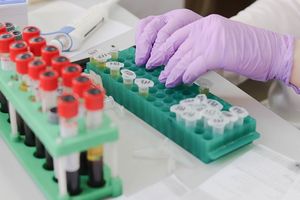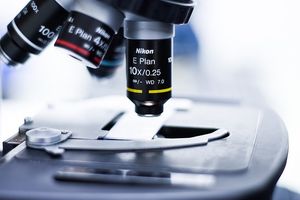What is HPV?
The human papillomavirus (HPV) is a highly contagious virus that is mainly spread through unsafe sex with different partners. Almost everyone gets HPV at some point, but you often don't notice it because your body clears the virus itself. In some cases, HPV can cause genital warts or even cancer, such as cervical cancer in women. This is also the reason that children from the age of ten are vaccinated against HPV.
Approximately 80 to 90 percent of people get an HPV infection at some point. Because symptoms usually do not occur and the immune system often clears the virus itself within two years, it is difficult to recognize. If the body does not clear the virus, it can become a chronic infection. That is why it is important to be aware of HPV and to take measures to prevent serious consequences.

How do you get the HPV virus?
HPV spreads when the infected skin of the penis, vagina or anus comes into contact with the same parts of someone else. Infection can also occur via the mucous membrane of the penis, vagina, anus, uterus or throat, especially during various forms of sex (oral, anal, vaginal, fingering, masturbation). HPV is even transmitted through skin-to-skin contact, sharing sex toys, or even using the same towel. People with HPV have an increased risk of other STDs, which is why regular testing for HPV is strongly recommended, also to protect potential sexual partners.

How do I know if I have HPV?
HPV is usually only discovered during the population screening for cervical cancer, where you receive a self-test in the mail when you are 30. This test, enclosed with the letter about the cervical cancer screening, allows you to take some mucus from your vagina. You then send this to the laboratory, where they test for the presence of HPV.
Another way in which HPV is discovered is through a smear test via your GP, especially if you have symptoms that could be related to cervical cancer. In some cases, further examination may be necessary to determine whether there is a precancerous stage. These examinations are sometimes also performed for complaints in the anal area.
Treatment of HPV
Het lichaam geneest meestal zelf van HPV, maar factoren zoals infecties, verminderde afweer, medicijngebruik, veel seksuele contacten, roken en gelijktijdige infecties kunnen de kans op genezing verminderen. Hoewel er geen medicijn is tegen HPV, kunnen geneesmiddelen zoals podofyllotoxine, imiquimod of sinecatechine helpen bij aandoeningen zoals genitale wratten. Deze wratten verdwijnen vervolgens meestal binnen twee jaar, maar het virus blijft aanwezig, waardoor herinfectie mogelijk is. Bij vrouwen met HPV en afwijkende cellen wordt een gynaecoloog geraadpleegd voor onderzoek en mogelijke behandelingen, waaronder lisexcisie, conisatie of lasertherapie.
Hoe kan ik mijzelf beschermen tegen HPV?
Veroorzaakt HPV kanker?
Is HPV een soa?
Ja, HPV (humaan papillomavirus) wordt beschouwd als een seksueel overdraagbare aandoening (soa). Het virus wordt hoofdzakelijk verspreid door seksueel contact, inclusief vaginale, anale en orale seks. HPV is een groep virussen met meer dan 200 verschillende soorten.
Kun je seks hebben als je HPV hebt?
De meeste mensen komen minstens een keer in hun leven in contact met HPV, en velen weten het niet eens. Omdat HPV veel voorkomt en de meeste infecties vanzelf verdwijnen zonder enige gezondheidseffecten, is het over het algemeen veilig om seks te blijven hebben, zolang je de nodige voorzorgsmaatregelen neemt. Mocht je net te horen hebben gekregen dat je HPV hebt, praat hier dan eerst over met je huisarts. Als je genitale wratten hebt, kan hij of zij je aanbevelen om te wachten met seks totdat ze zijn verdwenen om verspreiding van het virus via huid-op-huidcontact te voorkomen.
